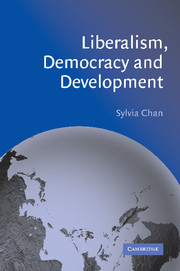Book contents
- Frontmatter
- Contents
- Acknowledgements
- List of abbreviations
- Introduction
- 1 The question: is ‘liberal democracy’ good for economic development?
- Part I The present context of democratisation and decomposing ‘liberal democracy’
- Part II The democracy–development debate: old problem, new thinking
- Bibliography
- Index
1 - The question: is ‘liberal democracy’ good for economic development?
Published online by Cambridge University Press: 22 September 2009
- Frontmatter
- Contents
- Acknowledgements
- List of abbreviations
- Introduction
- 1 The question: is ‘liberal democracy’ good for economic development?
- Part I The present context of democratisation and decomposing ‘liberal democracy’
- Part II The democracy–development debate: old problem, new thinking
- Bibliography
- Index
Summary
What is the relevance of ‘liberal democracy’ to a developing country? How to think of the desirability, feasibility, conditions and possibilities of ‘liberal democracy’ for such a country, where there is an important need for ‘economic development’, a cultural and historical backdrop different from the West, and a state with different capacities? In exploring this question, this book goes back to the basic, big questions of what ‘liberal democracy’ actually consists in and why it is a good (as fact or idea, in its consequences or in itself). Can what ‘liberal democracy’ delivers (or is thought, perhaps uniquely, to deliver, most importantly for our purposes, ‘economic development’) be delivered by regimes of a distinctively different kind (how distinctively different?)? and different in what ways? and, enduringly different, or different only in their recent manifestations?
The focus of this book is therefore on the relationship between ‘liberal democracy’ and ‘economic development’. With the ending of the Cold War, ‘liberal democracy’ seems to have become the only, and unchallengeably, good form of government, with many countries around the world undergoing ‘democratisation’. Indeed, some are pressed to do so by the emergence of the ‘good governance’ agenda within such international institutions as the World Bank. At the same time, one of the urgent needs for many of these countries is for economic development. Under these circumstances, the question of the democracy–development relation acquires a new significance and urgency. More exactly, what is the relevance of ‘liberal democracy’ for economic development?
- Type
- Chapter
- Information
- Liberalism, Democracy and Development , pp. 10 - 36Publisher: Cambridge University PressPrint publication year: 2002

